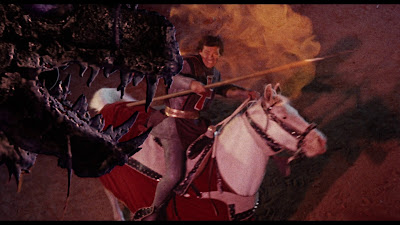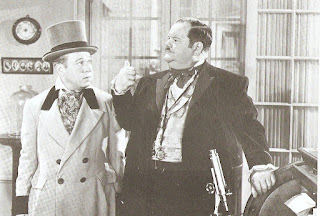.
At a time in the 1960s when Italian sword and sandal action films dominated the drive-in movie screens, American director Bert I. Gordon created this medieval fantasy adventure epic – The Magic Sword (1962). Gordon was known for films depicting giants, usually as a result of atomic radiation, such as a giant spider, giant grasshoppers, giant ants, a giant man in diapers, and even giant teenagers. The Magic Sword is considered by many of Gordon's fans as his best and most ambitious film. From a technical filmmaking and storytelling perspective, The Magic Sword is Gordon's best film.
Princess Helene (Anne Helm) has disappeared without a trace. Lodac the wizard, played brilliantly by Basil Rathbone, has kidnapped the princess. He appears before Helene's father, the king (Merritt Stone), and demands revenge for the king's father executing his sister at the age of 18 for witchcraft. Lodac releases seven curses on the land and threatens to feed the princess to his dragon in seven days. One of the king's knights – Sir Branton (Liam Sullivan), sets out to rescue the princess so he can marry her. Lodac warns that it will not be easy for Branton and his men to find his castle where the princess is being held in a cell.

Meanwhile, sorceress Sybil, played by Estelle Winwood, is foster mother to Sir George (Gary Lockwood), who will not allow George to leave their home until he is twenty-one and in the possession of a magic sword and a strong white horse. George wants to leave their home so he can rescue princess Helena first, and win her love. George tricks Sybil into getting trapped in an underground cavern so he can leave with the magic sword and white horse to find the princess. George assembles six brave knights to follow him on his journey to find the princess.
Sir George and his six knights appear before the king at his castle. George tells the king that he wants to save the princess, but sir Branton insists that he will be the one to rescue the princess and marry her. Branton challenges George to a duel, but his sword is broken across George's chest as he strikes him.
The Magic Sword is filled with many interesting set pieces and well done special effects for 1962. Brandon, George and their knights encounter a forest of dead trees and a giant man eating ogre. The forest is filled with bubbling lava pits. The knights battle the giant with spears. George attempts to rescue a knight who has fallen into a hot lava pit. While rescuing the knight, George is pushed into the pit by Branton.
Another set piece shows cone headed humans in a castle feasting at a table while the eyes of stone gargoyles move back and forth near a fireplace mantle. The princess encounters a hanging cage of midgets when she wanders away from her cell. An uncredited appearance by midget actor Angelo Rossitto happens during a scene in princess Helene's cell. Cult actress Maila Nurmi, known for her iconic role of Vampira on TV in the 1950s and Plan 9 From Outer Space (1959), appears in the film as a hag. Another cult actor, Richard Kiel, plays a pinhead character.

Director Gordon saves his best set piece and special effect for the ending of the film when Sir George frees Princess Helene from a two headed fire breathing dragon. George battles the dragon with his magic sword. This final scene shows the connection of the Magic Sword to the story of St. George and The Dragon. Helene and George are married and everyone lives happily ever after, just like in a fairytale story. The film was also marketed as La Espada Magica, St. George and The Dragon, St. George and The Seven Curses, The Seven Curses of Lodac, Happy viewing.
(The Magic Sword is available at many online locations. A great print is at Tubi. It is also on Amazon Prime. And here's a link to a You Tube print.)
Reviewed by Steve D. Stones











